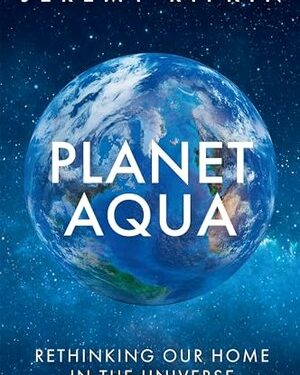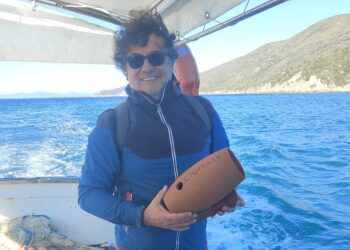| Planet Aqua: Rethinking Our Home in the Universe is available now on Amazon Advance Praise for Planet Aqua Forget the idea that we live on a land planet. After reading Rifkin’s eye-opening account of our Planet Aqua, a water planet, you will never look at the Earth in the same way again. It’s a much- needed new dimension of the climate conversation, and a smart read for business leaders navigating our changing world.– Paul Polman, former CEO of Unilever and past President of the International Chamber of Commerce Planet Aqua will shock most people. Jeremy Rifkin points out that instead of living on a land planet we actually live on a water planet – fresh, salt, and frozen – and this changes all of our long-held beliefs. Now, climate change is rapidly disrupting the hydrosphere, taking us into a foreboding future of floods, droughts, heatwaves, wildfires, and hurricanes, pushing many species to extinction, including our own. Rifkin’s Planet Aqua gives us an entirely new story about our home in the universe that hopefully will change the way we think, act, and thrive alongside our fellow creatures on a water planet.– Jane Goodall, PhD, DBE, Founder of the Jane Goodall Institute & UN Messenger of Peace With Planet Aqua, Jeremy Rifkin presents a thought-provoking and absorbing vision of humanity’s future that centers on water as the “the animating source of life”. It’s a compelling and persuasive read that redefines our relationship with the Earth’s most complex and vital sphere.– Sir Richard Branson, Founder of The Virgin Group Rifkin’s prescient Planet Aqua is a beck and call to humanity like God’s instruction to Noah in the face of the catastrophic deluge in the book of Genesis. He reminds us that the future of the planetary hydrosphere will determine our own fate and the fate of our fellow creatures – a prophetic message that we need to absorb, reflect, and act on.– Johan Rockström, Director of the Potsdam Institute for Climate Impact Research Europe and Asia lead the world with the introduction ofa “Blue Economy” to accompany the “Green Economy,”and now the United States needs to catch up Jeremy Rifkin’s new book Planet Aqua: Rethinking Our Home in the Universe will be published simultaneously in all the principal world languages in September 2024. What would happen if we suddenly realized that the planet we live on appeared eerily alien, as if we’d been teleported to some other distant world? That frightening prospect is now. Our planetary hydrosphere, which animates all life on Earth, is rebelling in the wake of a global warming climate, unleashing blockbuster winter snows, biblical spring floods, devastating summer droughts, heatwaves and wildfires and deadly autumn hurricanes, wreaking havoc on ecosystems, infrastructure, and society. While fossil fuels lit the fuse, it’s the hydrosphere that’s ringing the death knell. In Planet Aqua, Jeremy Rifkin argues that we have misjudged the very nature of our existence and to what we owe our lifeline. We have long believed that we live on a land planet when in reality we live on a water planet, and now the Earth’s hydrosphere is taking us into a mass extinction as it searches for a new normal. Rifkin asks us to imagine the incredible hubris of believing that our species could sequester, pacify, propertize, commodify, and hold dominion over all the waters of the planet for our exclusive utilitarian uses. Yet, that’s exactly what we set out to do six thousand years ago with the rise of urban hydraulic civilizations around the world. And now we find ourselves trapped in a massive commercial juggernaut of hydropower superdams, artificial lakes, reservoirs, and ubiquitous water infrastructure that’s collapsing in the throes of a rewilding hydrosphere. The great reset, says Rifkin, is rethinking the waters as a “life source” rather than a “resource” and learning how to adapt to the hydrosphere rather than adapting the hydrosphere to us. Rifkin takes us into a new future where we will need to reassess every aspect of the way we live – how we engage nature, pursue science, govern society, conceptualize economic life, educate our children, and even orient ourselves in time and space on our water planet. The next stage in the human saga is to ‘rebrand’ our home Planet Aqua and usher in a Blue Economy to accompany the Green Economy. The big conversation taking place in Europe over the past 6 months is the call for a ‘Blue Deal’ to accompany the ‘Green Deal’ as the next leap forward in the European Union (see enclosed articles: 1, 2, 3, 4). The ‘Blue Economy’ agenda is also emerging in China and Korea as a centerpiece for rethinking life on Planet Aqua and is going to migrate to North America, the UK, and other nations around the world as well in the coming months. The European Economic and Social Committee, the European Committee of the Regions, critical industries, trade associations, the farming community, government, academia, and civil society are all coalescing around a storyline and game plan to address a dramatic change in the climate brought on by a rewilding hydrosphere that’s killing off our fellow creatures and endangering our own species on a scale unprecedented in history – and everywhere, humanity is frightened and looking for answers. The call for a massive ‘Blue Deal’ to go hand-in-hand with the current ‘Green Deal’ will be the centerpiece of the new expanded agenda of the European Union. The conversation is focusing on a number of critical themes including demolishing outmoded superdams and artificial reservoirs, the construction of new resilient water infrastructure, the introduction of omnipresent distributed water internets and water microgrids, portable desalination devices and water purification systems, sponge cities, ephemeral pop-up 3D printed communities, water calendars and safe climate corridors, alongside extending legal rights to rivers to run free, deploying green hydrogen infrastructure, stewarding lakes, rivers, and streams as shared commons, addressing the dire threat of groundwater depletion, repurposing the water-energy-food nexus, pursuing paradigmic shifts in science and technology on a water planet, and developing new approaches to pedagogy, curricula, clinical learning, and incubator projects at the universities and secondary school level. This fundamental turning point in the way the human family relates to water on Planet Aqua will underwrite a rethink in the deployment of policies and practices going forward, putting the ‘Blue Economy’ alongside the ‘Green Economy’ at the top of the agenda for nations around the world. Planet Aqua provides the narrative and worldview for rethinking life on our water planet as well as a robust agenda across every aspect of society in making this transformation in our species’ future. Underpinned by robust research, this major new work by one of the world’s leading public intellectuals aims to redefine the very core of our existence on Planet Aqua. We are coming to grips with the reality that we live on a water planet Jeremy Rifkin is the best-selling author of twenty-three books translated into thirty-five languages. He is a principal architect of the European Union’s and China’s economic plans for transitioning into a Third Industrial Revolution to address climate change and he served as an advisor to Senate Majority Leader Charles Schumer on the U.S. infrastructure plan. He is listed among the top ten most influential economic thinkers in The Huffington Post’s global survey of “The World’s Most Influential Voices.” |
| DETAILED CONTENTS Part One The Imminent Collapse of Hydraulic Civilization 1) First There Was the WatersDéjà vu and the Second DelugeOur Aquatic Self: How Humans Emerged from the Deep2) The Earth Be Dammed: The Dawn of Hydraulic CivilizationThe Making of a Social OrganismThe Invention of EconomicsDrowning in Progress3) Gender Wars: The Struggle Between Terra Firma and Planet AquaPicking Sides: The War of Goddesses and GodsWomen: The Carriers of the Water4) The Paradigmatic Transformation from Capitalism to HydroismThe Water-Energy-Food NexusLeaving Capitalism Behind Part Two The Canary in the Mine: How the Mediterranean Eco-Region Became Day Zero on a Warming Earth and a Bellwether of the Second Coming of Life 5) The Near Death and Rebirth of the MediterraneanDay Zero: When Nations Run DryRenewables to the Rescue and a Second Life for the Mediterranean EcosystemWater, Water, Everywhere, But Not Any Drop to Drink…Until Now6) Location, Location, Location: The Eurasian PangaeaThe Bridge to Europe and Asia Part Three We Live on Planet Aqua and That Changes Everything 7) Freeing the WatersOpening the FloodgatesHarvesting the Hydrosphere8) The Great Migration and the Rise of Ephemeral SocietyThe Renaissance of the Ephemeral Arts and the Reset of Time and SpaceHow Plato Took Our Species Down the Wrong Path9) Rethinking Attachment to Place: Where We’ve Come from and Where We’re HeadingStepping Into Neo-NomadismEphemeral Cities and Ephemeral WatersA New Business Model: Additive Manufacturing and Provider-User Networks10) Bringing High-Tech Agriculture IndoorsVertical Farming11) The Eclipse of Sovereign Nation States and the Gestation of Bioregional GovernanceMass Migration and the Issuing of Climate PassportsMilitary Defense Gives Way to Climate Resilience Part Four Sublime Waters and a New Ontology of Life on Earth 12) Two Ways to Listen to the WatersVanquishing the Waters or Riding the WavesReorienting Ourselves in Time and Space in a Liquid Milieu13) Swallowed by the Metaverse or Buoyed by the AquaverseAn Ecological Vision or Dystopian Nightmare: Two Paths to the FuturePlanet Aqua: Rebranding Our Home |











